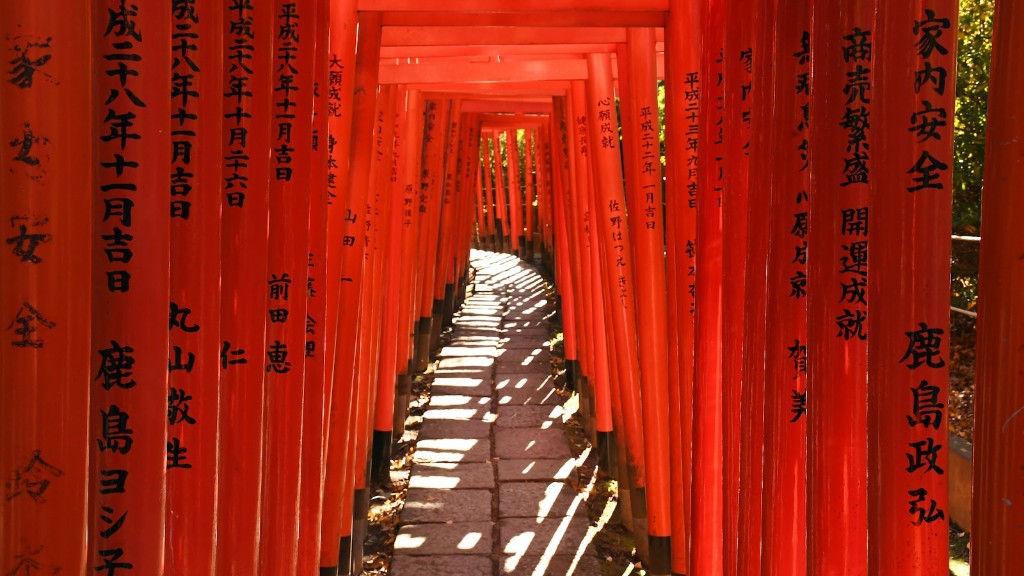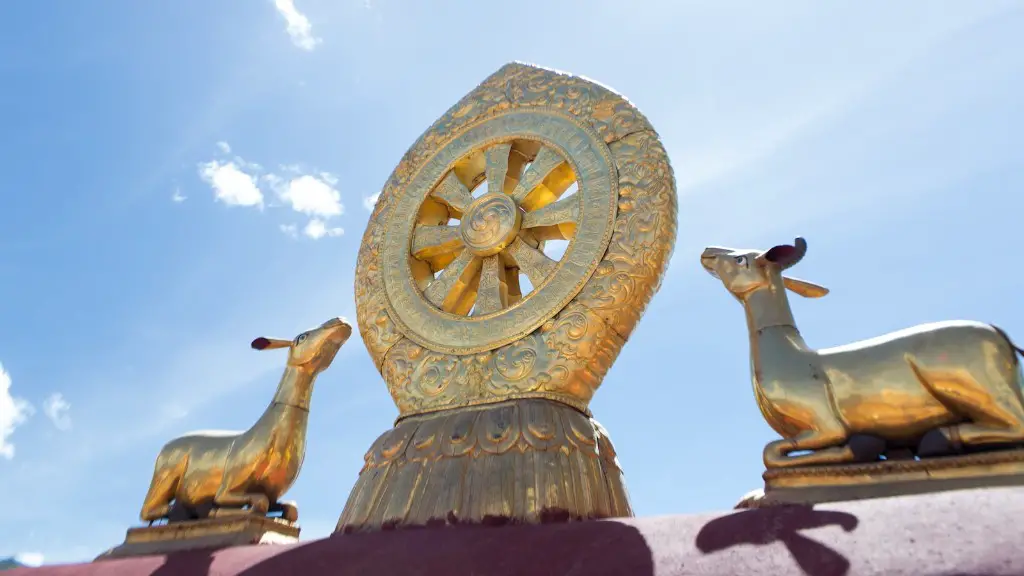Origin Of The First Human According To Hinduism
Every great culture and spiritual belief system has its own creation story in which the first human being is born. The Vedic tradition of Hinduism contains a rich and extensive mythology about the origins of creation, including the first human being. According to Hinduism, the first human being was an enlightened being, known as a Manu, who was the progenitor of all humanity and the law-maker of humankind.
In the Vedas and Upanishads, the authors of ancient Hindu scriptures, it is related that the first human was created by the divine power working through the process of evolution. It is said that the universe originated from a primordial state of chaos, out of which the first Manu emerged. The Manu, or human being, was the first entity to possess the spark of free will, along with the power of knowledge, who had to make decisions based on his own innate understanding. The Manu was also the first being to experience death, as he was responsible for introducing earth’s cycles of life and death.
The ancient scriptures of Hinduism describe the Manu as the progenitor and father of the first two humans, named Svaayambhuva Manu, which translates to ‘self-born Manu’. Manu is presented as an avatar of Vishnu, the preserver deity and one of the gods in the Hindu holy trinity. According to Hindu mythology, the Manu was charged with repopulating the earth, so he created a daughter, who in turn gave birth to seven males. These seven initiated the process of creating in the universe, which then evolved over time to eventually form the species of humans.
In Hinduism, the Manu is seen as the unifying figure in all of the creation stories. He is the one responsible for all of the laws that keep society in order, and devoted Indians pay their respects to him in religious festivities and rituals. The Manu is seen as a symbol of virtue, courage, wisdom and good governance, and his teachings serve as a source of inspiration for many who follow the ancient spiritual path of Hinduism.
The Divine Entity Of Manu
Manu is revered in Hinduism and known as an incarnation of divinity. He is seen as the symbol of the highest Truth, with the power to raise human consciousness to one of divine understanding. The Manu is said to be both the creator and protector of all of mankind, and his teachings are viewed as both a warning and guide for the spiritual path.
Hindu devotees believe that the Manu is responsible for the establishment of the four Vedas, the oldest and most sacred texts in Hinduism. It is said that he revealed these teachings to humanity in order to bring people closer to a higher consciousness, and to inspire individuals to cultivate their spiritual growth. The Manu is also regarded as the person who bestowed upon humanity the practice of dharma, which is a set of ethical and moral guidelines to live by that incorporates justice and order.
The Manu is seen as an embodiment of divine grace and protection, and is held in the highest esteem by many Hindus. He is prayed to in veneration, and his influence can be seen throughout the vast Hindu scriptures. He is a source of unconditional love and benevolence, and often referred to as the ‘father of mankind’ in Hinduism.
Benevolent Legacy Of Manu
The legacy of Manu is a powerful reminder of the bonds of brotherhood and relationship that exist between beloved caregivers and their children. He is seen as a living symbol of the respect and admiration we share with those closest to us, and of the reverence that binds us together as one. In Hinduism, Manu is a messenger of peace and goodwill, and his benevolent example is a source of strength and inspiration for believers.
The birth of Manu is the birth of the universal family, the story of all of humanity, valuing love and protection for those most vulnerable and dear to us. He serves as a model for harmony, compassion and unity, and his teachings are a reminder of the spiritual path and its ultimate goal of connecting to unconditional love. Manu offers a reminder that when we are our truest selves and strive to embody selfless qualities, kindness and respect, we are living in the spirit of divine spirit.
Esoteric Meaning Of Manu
At a deeper metaphysical level, Manu serves as a symbol of cosmic struggle against resistive forces, which represent the struggle against a materialistic world that can obscure the spiritual path. Through his courage and persistence, Manu ultimately succeeds in manifesting the ideal of cosmic harmony. He represents a struggle between mundane and spiritual forces, and a quest for divine fulfillment through transcendence.
Manu remains an inspiring figure in Hinduism to this day, with his legacy of wisdom and unity embraced by believers throughout the world. His teachings, along with those of the Vedas and Upanishads, help bring people closer to a higher consciousness and divine understanding. By closely examining the story of Manu, Hindus can gain insight into how to live a spiritually satisfying life, and cultivate a closer relationship with the divine.
Mystery Of Manu’s Physical Form
Hindu mythology does not provide a physical description of Manu, and scholars disagree about his physical appearance or form. Some interpret him to be formless and shapeless, while others interpret him to be a limited-form being. Some interpret him to possess multiple heads, while others state that he has a single head and is represented by a giant pot that radiates a supernatural light. The debate continues, and the mysterious form of Manu remains open to lively and passionate interpretations.
Hinduism speaks of a divine being in the form of Manu, credited as the progenitor of all humanity. The Manu is neither male nor female, and is seen as a symbol of divinity, courage, virtue and good governance in Hinduism. In addition to his creation of life, Manu is responsible for the establishment of the four Vedas and the practice of dharma, which provides ethical and moral guidance for humankind. His example of respect and benevolence serves as an inspiration for many, and helps bring people closer to spiritual understanding and the divine.
Symbolism Of Manu As The Universe Being
In Hinduism, Manu is seen as a symbol of the universe being. He indicates how the universe is ordered and functions, and embodies law and order through his various roles. He reveals the manifestation of the natural law, order, and unity, and transcends all forms of duality and illusion. In his role as a progenitor, Manu represents the origin and source of life, embodying the divine spark of consciousness that dwells within each of us.
Manu is seen as a symbol of hope and unity throughout Hindu mythology, and embodies the principles of justice and order. His teachings provide ethical and moral guidance, and serve as a source of inspiration for many believers. Ultimately, Manu stands as a reminder of the love and respect we share with one another, and of the spiritual path that leads to divine understanding.
Epic Hero Of Ancient Vedic Texts
In Hindu mythology, Manu is an epic hero of the ancient Vedic texts. He is seen as an embodiment of courage, virtue, and justice, and provides moral and spiritual guidance for humanity. He is responsible for imparting the four Vedas, as well as the practice of dharma, which embody a set of laws for peaceful and harmonious living. Manu is credited with repopulating the earth, and is seen as a symbol of renewal and rebirth.
Manu is a powerful figure in the Hindu religion, and his teachings remain a source of inspiration and wisdom. His courage, virtue and benevolence are a reminder of the bonds of brotherhood and family, and serve to unite all of humanity. He is a living reminder of the power of courage, truth, and unconditional love, and a symbol of divine harmony.
Conclusion
In Hinduism, Manu is a divine being seen as an embodiment of courage, virtue, and justice. He is a symbol of the highest Truth, a messenger of peace, and a representation of divine grace and protection. Through his example of love, benevolence and wisdom, Manu brings people closer to spiritual understanding and the divine. He teaches us to embrace harmony, compassion and unity, and serves as a reminder of the spiritual path and its ultimate goal of connecting to unconditional love.

